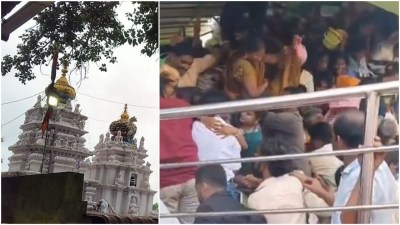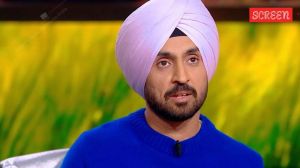Why Mulayam came to be sole claimant of 19% Muslim vote of UP
For the Muslim community that found itself pushed to the sidelines in the increasing drum beat of Ram temple politics, the Samajwadi Party that Mulayam formed in 1992 became their go-to party.
 Mulayam established himself as no pushover, stopping the rapidly accelerating Ram temple movement of the BJP in its tracks. (Express archive photo)
Mulayam established himself as no pushover, stopping the rapidly accelerating Ram temple movement of the BJP in its tracks. (Express archive photo)MULAYAM Singh Yadav was only into his first term as Chief Minister, and in the first year of his government, when he directed his police to open fire on kar sevaks gathered in Ayodhya and trying to climb onto the disputed Babri Masjid, on October 30, 1990.
The Janata Dal leader was one among several stalwarts in the socialist firmament at that time. However, with that action, Mulayam established himself as no pushover, stopping the rapidly accelerating Ram temple movement of the BJP in its tracks.
After the BJP withdrew support to the Janata Dal both at the Centre and in UP, Mulayam’s government collapsed. Just over two years after the police firing incident, another group of kar sevaks would climb up Babri and pull it down, as the BJP government in the state stood by.
CM Mulayam acted on local intelligence inputs and alert by senior police officers on the intentions of the kar sevaks before taking the decision to open fire. Appealing to Muslims to keep faith in the government, he said, “Masjid ko nuksaan nahin pahunchne denge (We will not let the Masjid be harmed).”
The police action, including a lathicharge, ensured that most of the kar sevaks dispersed. A handful scrambled up the Babri domes, but were brought down. There were different claims about the death toll, but the official number was around 30.
Encouraged by the BJP and its affiliates, he would be forever associated with the tag ‘Mulla Mulayam’ after this.
However, for the Muslim community that found itself pushed to the sidelines in the increasing drum beat of Ram temple politics, the Samajwadi Party that Mulayam formed in 1992 became their go-to party.
Such was the faith that the SP was seen as virtually the sole claimant of the 19% Muslim vote in the state, helping Mulayam forge a formidable Muslim-Yadav or ‘M-Y’ vote bank. The strength of the Muslim support for him also made him a leader sought out by parties beyond UP, post-1992.
Muslim support is believed to have powered the SP to 109 seats in the 1993 elections out of the 256 it contested, helping Mulayam become CM for a second term, with BSP support. Long before the term became common, this was social engineering on the part of Mulayam and BSP founder Kanshi Ram to stop the BJP. Their slogan was unapologetic about the strength of the forces they combined, as well as what it was meant to do: “Mile Mulayam, Kanshi Ram, hawa mein ud gaye Jai Shri Ram (Mulayam, Kanshi Ram are together now, where is Shri Ram).”
Though this coalition ended acrimoniously, with a violent guest house incident, the two parties emerged as the most powerful parties of UP from the episode.
Mulayam continued to command full Muslim support till his third term as CM (2003-2007), during which time the SP also saw its best Lok Sabha performance of 39 seats in the 2004 polls.
After 2003 and a brief stint as CM with the BJP, BSP supremo Mayawati started reaching out to Muslims as well as upper castes to expand her politics beyond Dalits. This strategy ensured the BSP’s best-ever performance in 2007, when it won with a simple majority.
Since then, Mayawati has ensured tickets to Muslims in all Assembly and Lok Sabha polls, and always gets a share of the Muslim vote.
Says SP Moradabad MP S T Hasan: “Mulayam Singhji stood for all castes who need help, but he always stood for the Muslim community. Be it giving employment to Muslims in the police, PAC and extending help whenever needed, Mulayam Singhji took decisions as per the Constitution, which is missing today. Today’s politics is based on Hindu-Muslim.”
As the reins of the SP passed on to son Akhilesh and as the party’s tallest Muslim leader, Azam Khan, found himself on the wrong side in the new political dispensation, there has been a modulation of that stand.
One of the grievances raised by Muslims, including Azam Khan’s aides, after the SP failed to dislodge the BJP from power in the recent Assembly elections was Akhilesh “turning away” from the community and remaining silent on its issues.
Photos





- 01
- 02
- 03
- 04
- 05


























